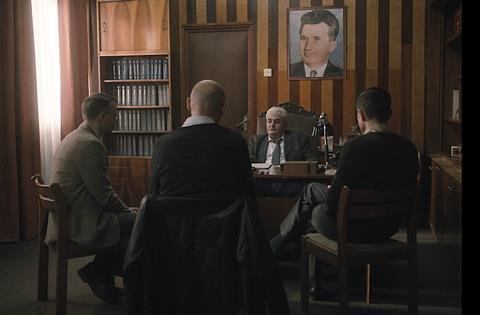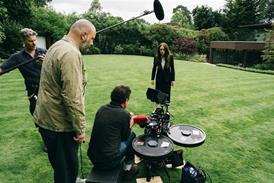The fall of Romanian leader Nicolae Ceausescu is explored in this 1989-set debut which won the top Horizons prize at Venice

Dir/scr: Bogdan Mureşanu. Romania/Serbia. 2024. 138mins.
Romania, a few days before Christmas in 1989, and the Nicolae Ceausescu regime is in its death throes. Not that the ordinary people of Bucharest know it – the news of an uprising in the city of Timisoara and the subsequent massacre of protestors by government forces is suppressed and sanitised, and a paralysing fear of the dictatorship still prevents many from speaking out against it. With his accomplished feature debut, Bogdan Mureşanu views a pivotal moment in Romanian history – the fall of the Ceausescu regime – through the eyes and the interconnected stories of six ordinary people. It’s a confident and, at times, savagely funny work which, while a little over-long, builds to a blisteringly powerful conclusion.
Captures the exhilarating impact of history in the making
Having previously worked in advertising and literature, Mureşanu pivoted to filmmaking in 2012 with the short film Half Shaved; a latter short, 2018’s The Christmas Gift, won numerous prizes including Best Short Film at the European Film Awards. That work, which tells of a father’s consternation when he discovers that his son’s letter to Santa lists his Dad’s Christmas wish as “the death of Uncle Nic” (a less than affectionate nickname for Ceausescu), is incorporated as one of the strands in this feature. The New Year That Never Came should enjoy a warm reception at festivals going forward, and could find a home with arthouse distributors or a curated streaming platform, especially after its Best Film win at Horizons. And in writer and director Mureşanu, it announces a notable new talent in Romanian cinema.
Mureşanu’s vision for the picture is evident from the outset. The film is shot in a boxy 4:3 aspect ratio, both to emphasise the airless, oppressive qualities of life under the regime and as a nod to the television broadcasts of the era – a feature of one of the story strands. Prying handheld cameras adds to the nerviness of the atmosphere – these are all characters, we sense, who are accustomed to being spied upon. The choice of colours also feels in tune with the period; for much of the film there’s a palette of murky, unpromising greys and watery greens punctuated by the lacklustre sparkle of communist Christmas decorations.
Against this backdrop, a seemingly random group of people unwittingly approach what will become the most momentous day of their lives. Gelu (Adrian Vancica), the father from The Christmas Gift, is a factory worker who is instructed by his boss to drive to an address and help move some furniture. There he meets Margareta (Emilia Dobrin), a woman whose house, like the rest of the neighbourhood, is scheduled for demolition. She’s grieving for the loss of her home and unimpressed by the new apartment that her son, Ionut (Iulian Postelnicu) has found for her.
A secret policeman, Ionut is alert for “hostile actions and hateful inscriptions” at the local university. Laurentiu (Andrei Miercure), a lanky student with a haphazard plan of escaping across the Danube to Yugoslavia, is a figure of interest for Ionut following his involvement in a satirical comedy play. Laurentiu’s father Stefan (Mihai Calin) is the harried stage manager at the television station, where the lead actress in a pre-recorded, fervently patriotic New Year’s Special has just defected and her close-ups need to be re-recorded with a less politically toxic look-alike performer. That’s where theatre actress Florina (Nicoleta Hancu) comes in. But since she is frantically trying to contact her ex-boyfriend in Timisoara, Florina is not inclined to pay tribute on camera to Ceausescu as “the most beloved son of the people”.
There’s a lot going on, and initially, the film coasts a little, before gradually picking up momentum. But a near 20-minute final sequence, set to Ravel’s Bolero, builds to an explosive crescendo, seamlessly blending archive footage into the action and capturing the exhilarating impact of history in the making.
Production company: Kinotopia, All Inclusive Films
International sales: Cercamon MFZE sebastien@cercamon.biz
Producers: Bogdan Mureșanu, Vanja Kovacevic
Cinematography: Boroka Biro, Tudor Platon
Editing: Vanja Kovacevic, Mircea Lacatus
Production design: Iulia Fulicea, Victor Fulicea
Main cast: Adrian Vancica, Iulian Postelnicu, Emilia Dobrin, Nicoleta Hancu, Andrei Miercure, Mihai Calin





















